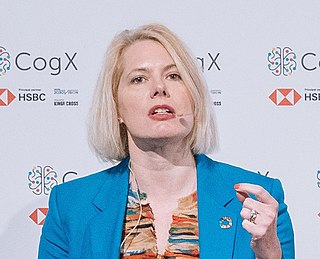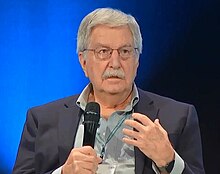Media studies is a discipline and field of study that deals with the content, history, and effects of various media; in particular, the mass media. Media Studies may draw on traditions from both the social sciences and the humanities, but mostly from its core disciplines of mass communication, communication, communication sciences, and communication studies.
Political science is the scientific study of politics which is a social science dealing with the analysis and implementation of systems of governance and its impact on societies.
Melvin Lawrence DeFleur was a professor and scholar in the field of communications. His initial field of study was social sciences.

An academic discipline or field of study is a branch of knowledge, taught and researched as part of higher education. A scholar's discipline is commonly defined by the university faculties and learned societies to which they belong and the academic journals in which they publish research.
New media are communication technologies that enable or enhance interaction between users as well as interaction between users and content. In the middle of the 1990s, the phrase "new media" became widely used as part of a sales pitch for the influx of interactive CD-ROMs for entertainment and education. The new media technologies, sometimes known as Web 2.0, include a wide range of web-related communication tools such as blogs, wikis, online social networking, virtual worlds, and other social media platforms.

Science studies is an interdisciplinary research area that seeks to situate scientific expertise in broad social, historical, and philosophical contexts. It uses various methods to analyze the production, representation and reception of scientific knowledge and its epistemic and semiotic role.
Karl Wolfgang Deutsch was a Czech social and political scientist. He was a professor at MIT, Yale University and Harvard University, as well as Director of WZB Berlin Social Science Center.
In media studies, mass communication, media psychology, communication theory, and sociology, media influence and themedia effect are topics relating to mass media and media culture's effects on individuals' or audiences' thoughts, attitudes, and behaviors. Through written, televised, or spoken channels, mass media reach large audiences. Mass media's role in shaping modern culture is a central issue for the study of culture.
Audience theory offers explanations of how people encounter media, how they use it, and how it affects them. Although the concept of an audience predates media, most audience theory is concerned with people’s relationship to various forms of media. There is no single theory of audience, but a range of explanatory frameworks. These can be rooted in the social sciences, rhetoric, literary theory, cultural studies, communication studies and network science depending on the phenomena they seek to explain. Audience theories can also be pitched at different levels of analysis ranging from individuals to large masses or networks of people.
Gary T. Marx is a scholar in the field of sociology. He was born on a farm in central California, raised in Hollywood, and grew up in Berkeley.
Wilbur Lang Schramm was a scholar and "authority on mass communications". He founded the Iowa Writers' Workshop in 1935 and served as its first director until 1941. Schramm was hugely influential in establishing communications as a field of study in the United States, and the establishing of departments of communication studies across U.S. universities. Wilbur Schramm is considered the founder of the field of Communication Studies. He was the first individual to identify himself as a communication scholar; he created the first academic degree-granting programs with communication in their name; and he trained the first generation of communication scholars. Schramm's mass communication program in the Iowa School of Journalism was a pilot project for the doctoral program and for the Institute of Communications Research, which he founded in 1947 at the University of Illinois at Urbana–Champaign, now housed in the UIUC College of Media. At Illinois, Wilbur Schramm set in motion the patterns of scholarly work in communication study that continue to this day.
Media psychology is the branch and specialty field in psychology that focuses on the interaction of human behavior with media and technology. Media psychology is not limited to mass media or media content; it includes all forms of mediated communication and media technology-related behaviors, such as the use, design, impact, and sharing behaviors. This branch is a relatively new field of study because of advancement in technology. It uses various methods of critical analysis and investigation to develop a working model of a user's perception of media experience. These methods are used for society as a whole and on an individual basis. Media psychologists are able to perform activities that include consulting, design, and production in various media like television, video games, films, and news broadcasting. Media psychologists are not considered to be those who are featured in media, rather than those who research, work or contribute to the field.
The Columbia Institute for Tele-Information (CITI) is one of several research centers for Columbia Business School, focusing on strategy, management, and policy issues in telecommunications, computing, and electronic mass media. It aims to address the large and dynamic telecommunications and media industry that has expanded horizontally and vertically drive by technology, entrepreneurship and policy.
Susan Leigh Star (1954–2010) was an American sociologist. She specialized in the study of information in modern society; information worlds; information infrastructure; classification and standardization; sociology of science; sociology of work; and the history of science, medicine, technology, and communication/information systems. She commonly used the qualitative methods methodology and feminist theory approach. She was also known for developing the concept of boundary objects and for contributions to computer-supported cooperative work.
Andrea Lee Press is an American sociologist and media studies scholar. She is the William R. Kenan Jr. Professor of Media Studies and Sociology, and Chair of the Media Studies Department, at the University of Virginia.
Daniel Lerner was an American scholar and writer known for his studies on modernization theory. Lerner's study of Balgat Turkey played a critical role in shaping American ideas about the use of mass media and US cultural products to promote economic and social development in post-colonial nations. In 1958, he wrote the seminal book The Passing of Traditional Society: Modernizing the Middle East. Scholars have argued that the research project that formed the basis of the book emerged from intelligence requirements in the US government, and was a result of the contract between the Office of International Broadcasting and Columbia University.

Gina Neff is the Executive Director of the Minderoo Centre for Technology and Democracy at the University of Cambridge. Neff was previously Professor of Technology & Society at the Oxford Internet Institute and the Department of Sociology at the University of Oxford. Neff is an organizational sociologist whose research explores the social and organizational impact of new communication technologies, with a focus on innovation, the digital transformation of industries, and how new technologies impact work.

Zeynep Tufekci is a Turkish-American sociologist. A professor at Columbia University, she also writes as a columnist for The New York Times. Her work focuses on social media, media ethics, the social implications of new technologies, such as artificial intelligence and big data, as well as societal challenges such as the COVID-19 pandemic using complex and systems-based thinking. According to The Chronicle of Higher Education, she is one of the most prominent academic voices on social media and the new public sphere. In 2022, Tufekci was a Pulitzer Prize finalist for her “insightful, often prescient, columns on the pandemic and American culture”, which the committee said “brought clarity to the shifting official guidance and compelled us towards greater compassion and informed response.”
Holli Semetko, frequently published as Holli A. Semetko, is a comparative political scientist, currently serving as the Asa Griggs Candler professor of media and international affairs at Emory University. She served as Emory University's Vice Provost for International Affairs, Director of the Office of International Affairs, and the Director of the Claus M. Halle Institute for Global Learning from 2003-13. In a 2019 study on the top 400 most-cited authors in political science, Semetko was named among the top 40 most cited women in political science. Semetko's current research focuses on social media, campaigning and influence, political communication, public opinion, and political campaigns in comparative perspective. She currently serves as Conference Chair for the 2023 annual meetings of the World Association for Public Opinion Research (WAPOR) in Salzburg, Austria, see the call for abstracts here: https://wapor.org/events/annual-conference/current-conference/




